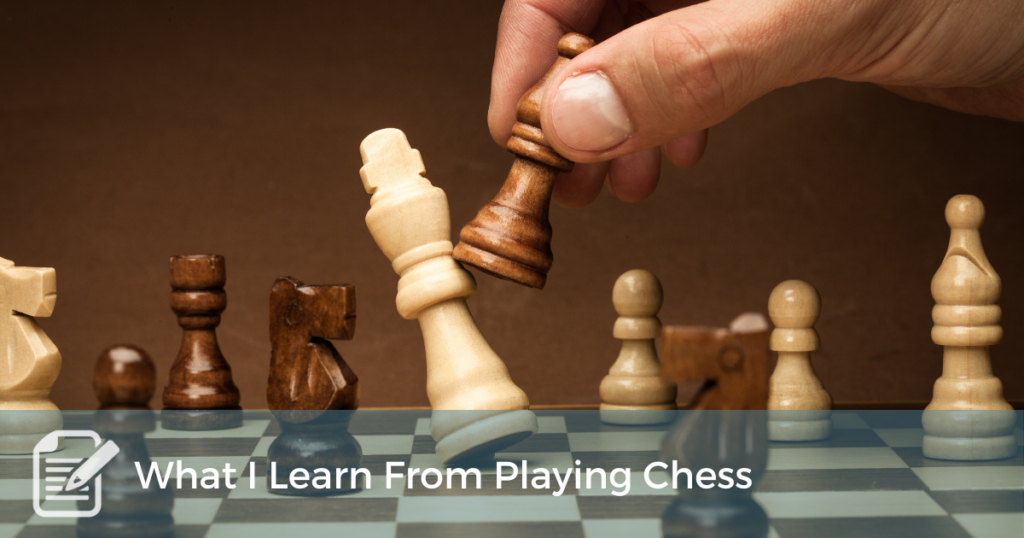Chess is one of the few games that does not depend on luck. You are not going to roll a seven and, surprisingly, win the game. You are not going to see an ace turn up on the river to complete your poker straight. You are going to win or lose because you planned, focused, and executed better than your opponent.
At the beginning of the year, I set a goal to improve at chess until I could regularly beat a 1500-rated player on chess.com. Out of the ten goals I set, I quickly realized this would be the most difficult one to achieve. The game requires dedication, a daily regimen of puzzles, and often—most challenging of all—a fresh and energetic mind.
If I play when I am tired, I will lose. Chess requires the best hours of my day. So why not quit? I am not a smoker, but I know what it is to start and quit over and over. One reason I have not quit is that I want to see this goal through—not only to accomplish what I set out to do, but also to learn from the experience. Secondly, my focus muscle, which I absolutely need for coaching, gets a great workout. I’m trying to develop a six-pack muscle on my brain.
Learn to Plan
Plan for the Future
Good chess players imagine a preferred future. Every move should be made with a purpose, with a strategy in mind. I want to create space or control specific areas. I aim to weaken my opponent’s position and expose weaknesses in her defense. You should not move a piece until you have a plan for what your next move—or maybe even your next two or three moves—will be.
Coaching is helping people get from where they are to where they want to go. Supported clients imagine a preferred future. Most people live in the present—or worse, in the past. I need to be sure that my client has a clear picture of their preferred future and that they know two or three key steps that will get them there. A wise adage says, “If you fail to plan, you plan to fail.”
Use All the Pieces
When you first start playing chess, you hope for a quick win. Some players prefer to play a gambit—an aggressive strategy that hopes to catch your opponent in a mistake. Seasoned players do not fall for the gambit, and the aggressor’s position soon falls apart. A good chess player is planning for the entire game and knows that developing all his pieces will greatly benefit him in the middle and endgame.
A coach needs to help the client identify all the pieces. Many clients assume they are the only piece on the board, but every person has multiple champions and others who are happy to help. The client should consider who else can help—and then plan to ask for their support. Most people do not like asking for help, but the client’s benefit will increase as they move closer to their eventual goal.
Learn to Focus
Flex the Focus Muscle
You need to play chess like you are dismantling a bomb. Being able to stay present in the moment is essential. When you get distracted, bad things happen. If I play when I am tired, I am almost assured to eventually lose my queen. It is like I fell asleep and woke to a nightmare. Once you lose your queen—with nothing in return—the game is over. Your lack of focus made the game a wasted effort.
Coaching requires incredible focus. If you coach for an hour, I can guarantee you will lose focus a number of times. Thankfully, coaching is not as precarious as chess. When you lose focus, you can regroup. Check in with your client from time to time to be sure you are both tracking along the stated goal. Use the built-in transition from exploring the topic to exploring possible action as a moment to regain your focus.
See the Whole Board
Several chess pieces—particularly the rooks, bishops, and queen—have sweeping moves. They can move from one end of the board to the other in a single move. This is amazingly easy to overlook. The average chess player tends to focus on a handful of squares and ignore the rest, only to overlook a piece that could swoop in and do significant damage.
A great coach encourages their client to take a broad look at their situation. Many situations can be impacted for the good or the bad by things just out of the client’s view. If we can simply get the client to turn their head left to right, in addition to a quick look behind and ahead, we can help them avoid unexpected damage—or lean into a surprisingly simple solution.
Learn to Execute
Be Cautiously Aggressive
Great chess players create increasing pressure on key squares. A common question is, What piece can I move that will make a more potent attack without leaving pieces in jeopardy? When I am executing poorly, I fail to attack with multiple pieces, and I fail to ensure those pieces cannot be easily taken. When I get impatient, I lose.
Your clients have various degrees of aggressive behavior. Some are incredibly disruptive. Others tend to only act in response to some outside stimulus. You need to help your client find a healthy middle ground where they are cautiously aggressive. This will require observation on your part, allowing the client to see whether to dial up or dial down the aggression.
Learn from Losing
You’re going to lose… a lot. Analyzing the loss is the best way to learn. Chess games do not last long. I play several games a day. Familiar positions recur regularly, and with proper analysis of past games, you now know what moves will be most helpful. I no longer fall into the same traps as I did in my early years.
We do not focus on the past in coaching, but at its heart, coaching is a learning catalyst. We have an opportunity to not only learn about our situations, but—more importantly—we learn about ourselves. Every coaching conversation should include at least one moment (and maybe more) where we direct the client to reflect on their learning. This is the ultimate power of coaching.
Conclusion
I started the year with a rating of 883 and a goal of reaching 1500. In three months, I’ve raised my rating by about 200 points. If I can continue at this rate, I should reach my goal before the end of the year. In my mind, that will be akin to not being able to run a mile and then finishing the year running a minor marathon. It will be a significant achievement.
The question a good friend asked me was, “How will this help you in your regular life?” It’s a good question. I have nine other goals that could benefit from the focus I’m giving to this one. My main answer is that playing chess is teaching me to think better. My ability to focus has to improve, and an improved ability to focus will make me a better writer, a better listener, and certainly a better coach.
Chess reminds me that every move I make in life takes me closer or further away from my goal. I need a cautious aggression to move me forward. Make every move on purpose. I am in the last leg of my professional journey. I badly want to finish well. Playing chess helps me focus on the elements that will lead to success.



